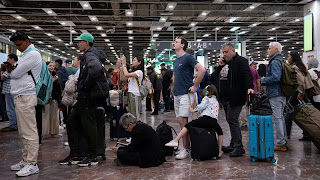The massive blackout that paralyzed Spain and Portugal — and briefly affected southern France — has raised serious questions about the vulnerabilities of the Iberian power grid. Spain’s electricity grid operator, Red Eléctrica, has ruled out a cyberattack as the cause of the disruption, which left thousands stranded in train stations and public transit hubs on Monday.
Eduardo Prieto, Chief Operating Officer of Red Eléctrica, confirmed there was “no intrusion in control systems,” echoing earlier statements by Portuguese Prime Minister Luís Montenegro. However, the precise cause of the outage remains unclear.
Authorities described the current findings as preliminary, and final conclusions are still pending. Spanish Prime Minister Pedro Sánchez emphasized the seriousness of the event, stating, “This cannot happen again,” and confirming that investigators are working to determine the exact sequence of failures.
The flow of information in the immediate aftermath was limited, fueling speculation and raising further questions. Experts have suggested a combination of technical failures rather than a single cause.
1. Was the Outage Caused by Renewable Energy?
Prime Minister Sánchez noted that 15 GW of energy—about 60% of demand at the time—“suddenly disappeared from the system... in just five seconds.” Prieto added that two disconnections occurred one second apart in the southwest of Spain, a region with significant solar power generation.
Such events can occur when electricity providers detect imbalances between supply and demand. To protect their systems, they may automatically shut down, which can destabilize the grid.
However, Sánchez later clarified that the blackout was not caused by an overabundance of renewable energy, and that demand at the time was relatively low — a trend that had persisted in the days leading up to the incident.
Grid frequency deviations from the standard 50 Hz can damage equipment, prompting companies to disconnect. If multiple companies do this in rapid succession, a cascading effect can trigger a large-scale blackout.
Hannah Christensen, a physicist at the University of Oxford, explained that short-term weather forecasts usually allow operators to anticipate renewable energy output and adjust accordingly. “It’s puzzling that this wasn’t predicted,” she noted.
Keith Bell of the University of Strathclyde added that grid systems reliant on solar and wind are typically designed with that variability in mind. “Spain has a lot of experience with wind and solar power, and a well-established forecasting system.”
He stressed that system failures can happen regardless of the energy source — be it renewables, fossil fuels, or nuclear — and likened the event to the “Swiss cheese model,” where multiple faults align to cause a failure.
2. Did the France–Spain Interconnection Play a Role?
Red Eléctrica also indicated that the power drop disrupted a grid interconnection between Spain and France.
Two main technologies link countries or grid sectors: standard alternating current (AC) lines and high-voltage direct current (HVDC) lines. Spain’s HVDC line has been operational for seven years and is considered reliable, according to Bell.
However, the Iberian Peninsula is often referred to as an “electrical island” due to its limited connections through the Pyrenees, making it more vulnerable to such disruptions.
Prime Minister Sánchez confirmed that electricity was restored thanks to support from France and Morocco, alongside gas and hydroelectric power sources.
3. Was a Rare Atmospheric Phenomenon Involved?
Initial reports suggested the outage might have been caused by an unusual atmospheric event. A statement attributed to Portugal’s grid operator, REN, claimed that extreme temperature fluctuations triggered anomalous vibrations in 400kV transmission lines, disrupting synchronization across the interconnected European grid.
However, REN spokesperson Bruno Silva denied that such a statement had been officially issued by the company, offering no further clarification.
As the investigation continues, experts stress the need for improved coordination, predictive technologies, and infrastructure resilience to prevent similar disruptions in the future.














0 Comments